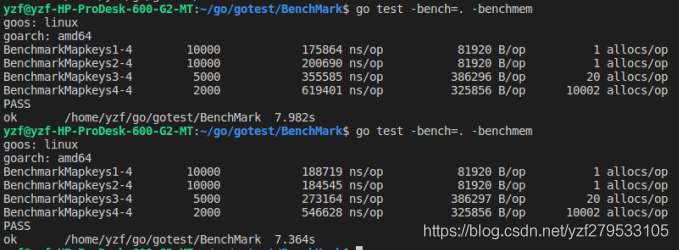best way: according to the length of the map, create a new array, walk through the map one by one press
method 1:
func getKeys1(m map[int]int) []int {
// 数组默认长度为map长度,后面append时,不需要重新申请内存和拷贝,效率较高
j := 0
keys := make([]int, len(m))
for k := range m {
keys[j] = k
j++
}
return keys
}method 2:
func getKeys2(m map[int]int) []int {
// 数组默认长度为map长度,后面append时,不需要重新申请内存和拷贝,效率较高
keys := make([]int, 0, len(m))
for k := range m {
keys = append(keys, k)
}
return keys
}other methods:
method 3:
func getKeys3(m map[int]int) []int {
// 注意:由于数组默认长度为0,后面append时,需要重新申请内存和拷贝,所以效率较低
keys := []int{}
for k := range m {
keys = append(keys, k)
}
return keys
}method 4:
func getKeys4(m map[int]int) int {
// 注意:虽然此写法简洁,但MapKeys函数内部操作复杂,效率极低
keys := reflect.ValueOf(m).MapKeys()
return len(keys)
}experimental results are shown in the figure (you can see that methods 1 and 2 have the highest efficiency and least memory operation) :

complete code as follows:
package test
import (
"reflect"
"testing"
)
// 初始化map
func initMap() map[int]int {
m := map[int]int{}
for i := 0; i < 10000; i++ {
m[i] = i
}
return m
}
func getKeys1(m map[int]int) []int {
// 数组默认长度为map长度,后面append时,不需要重新申请内存和拷贝,效率较高
j := 0
keys := make([]int, len(m))
for k := range m {
keys[j] = k
j++
}
return keys
}
func getKeys2(m map[int]int) []int {
// 数组默认长度为map长度,后面append时,不需要重新申请内存和拷贝,效率较高
keys := make([]int, 0, len(m))
for k := range m {
keys = append(keys, k)
}
return keys
}
// 初始化默认
func getKeys3(m map[int]int) []int {
// 注意:由于数组默认长度为0,后面append时,需要重新申请内存和拷贝,所以效率较低
keys := []int{}
for k := range m {
keys = append(keys, k)
}
return keys
}
// 使用反射
func getKeys4(m map[int]int) int {
// 注意:虽然此写法简洁,但MapKeys函数内部操作复杂,效率极低
keys := reflect.ValueOf(m).MapKeys()
return len(keys)
}
func BenchmarkMapkeys1(b *testing.B) {
// 初始化map
m := initMap()
b.ResetTimer()
for i := 0; i < b.N; i++ {
getKeys1(m)
}
}
func BenchmarkMapkeys2(b *testing.B) {
// 初始化map
m := initMap()
b.ResetTimer()
for i := 0; i < b.N; i++ {
getKeys2(m)
}
}
func BenchmarkMapkeys3(b *testing.B) {
// 初始化map
m := initMap()
b.ResetTimer()
for i := 0; i < b.N; i++ {
getKeys3(m)
}
}
func BenchmarkMapkeys4(b *testing.B) {
// 初始化map
m := initMap()
b.ResetTimer()
for i := 0; i < b.N; i++ {
getKeys4(m)
}
}